The Story - Chapter 16
Isaiah 6, commonly referred to as Isaiah’s Commission, is as inspiring as it is timeless. One of the most frequently quoted and cherished verses from this passage is Isaiah 6:8 (page 225 in The Story):
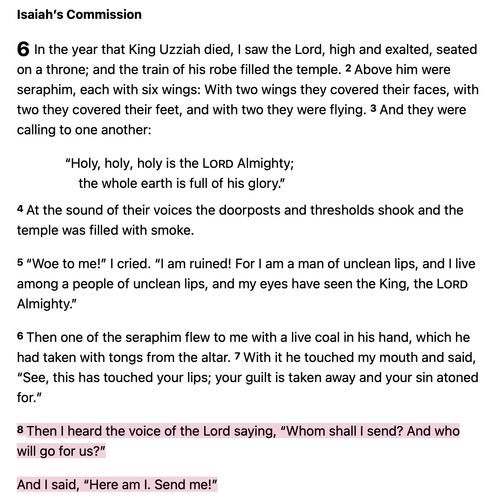
Isaiah’s commission is so compelling because it is so honest. In the presence of God’s majesty, one can only imagine the overwhelming sense of inadequacy and unworthiness. Though the phrase Isaiah uses may seem unusual, it is strikingly relatable:
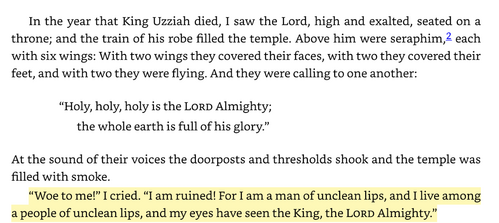
Consider what Isaiah says in 6:5—"unclean lips." This phrase is incredibly evocative: insults, rumors, gossip, lies, unkind comments, thoughtless remarks, prejudicial statements, put-downs, profanity, name-calling, broken promises, telling people what they want to hear, making excuses, shifting blame. Of course, as “good Christian types,” we try to keep these things to a minimum (!)—but in big and small ways, we are all people of unclean lips, as well as unclean thoughts and actions.
This idea isn’t just an Old Testament concept often associated with what some call a “judgmental God.” In Matthew 15, Jesus challenges us with a similar truth. He reminds us that it’s not what goes into a person that makes them unclean, but what comes out of their mouths.
This idea isn’t just an Old Testament concept often associated with what some call a “judgmental God.” In Matthew 15, Jesus challenges us with a similar truth. He reminds us that it’s not what goes into a person that makes them unclean, but what comes out of their mouths.
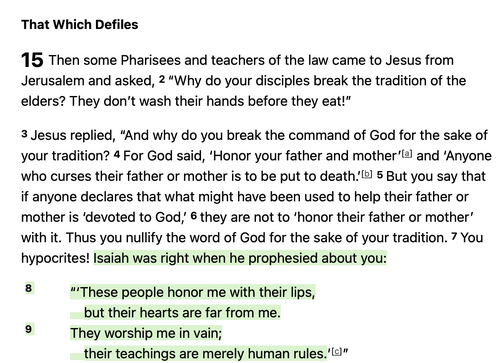
So, what’s the solution to unclean lips? Scripture presents a rather extreme image—searing away guilt, shame, and impurity with a hot coal. Taken literally, it’s painful and terrifying. But short of cleansing fire, how can we become people of clean lips—free from guilt and sin, redeemed and renewed? The simple answer is that we can’t do much of anything except receive the free and loving grace of God that makes all things new.
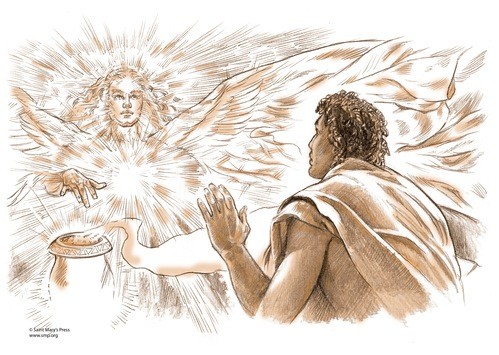
One Sunday morning, a young homeless woman walked into a United Methodist church in St. Louis. She wasn’t a regular churchgoer, but she had run out of options and, uncertain of what else to do, slipped into the back row and sat alone. She listened to the service, struggling to understand what was happening. Her anxiety grew as she heard the preacher talk about something called “Holy Communion.” As the pastor extended the invitation and led the Great Thanksgiving, she decided that this ritual wasn’t for her. It wasn’t meant for someone like her. She liked what she was hearing, but deep down, she knew she was unclean—Communion, she reasoned, wasn’t meant for people like her.
As she was lost in thought, she suddenly noticed a man and a woman walking toward her, carrying the bread and cup. Startled, she clasped her hands together and shook her head.
As she was lost in thought, she suddenly noticed a man and a woman walking toward her, carrying the bread and cup. Startled, she clasped her hands together and shook her head.
“What’s wrong?” the woman asked gently.
“I’ve never been here before. I don’t belong. I don’t even know what’s happening,” the young woman stammered.
“I’ve never been here before. I don’t belong. I don’t even know what’s happening,” the young woman stammered.
Both the man and the woman smiled warmly. Then the man spoke:
“You don’t have to belong here. Holy Communion is for everyone.”
“Not for me,” she whispered. “I’m not a good person.” She looked at the bread and cup, then shook her head. “That’s not for me.”
“Not for me,” she whispered. “I’m not a good person.” She looked at the bread and cup, then shook her head. “That’s not for me.”
The woman knelt down beside her:
“This is especially for you,” she said. “None of us deserve this. Communion is a gift from God for all of us. You don’t have to be ready for it—Communion makes you ready. It allows you to experience God’s love.”
Tears filled the young woman’s eyes. Unable to find the right words, she simply nodded. Closing her eyes, she unclasped her hands, opened her lips, and allowed the woman to place the bread—dipped in the cup—on her tongue. As the sweetness of the juice and the richness of the bread filled her mouth, she was overwhelmed. She began to weep, whispering,
“Thank you, thank you,” over and over.
A week later, she returned—this time bringing five of her friends. Spotting the woman who had served her Communion, she quickly waved her over:
“When’s Communion?” she asked eagerly.
“Oh, well…we serve Communion on the first Sunday of the month,” the woman replied.
“Oh, well…we serve Communion on the first Sunday of the month,” the woman replied.
The young woman’s eyes widened in shock,
“But we need it,” she said. “I haven’t felt anything that good in years, and I want my friends to feel it too.”
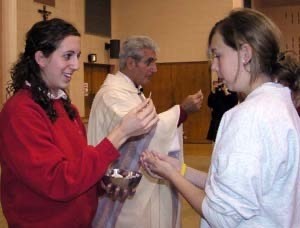
Communion is God’s gift to us—but it is not merely a gift for our own comfort or enjoyment. It makes us one with Christ, one with each other, and one in ministry to all the world. We are redeemed and renewed not for our own benefit alone, but for the sake of something greater. Like Isaiah, we are transformed so that we may be sent.
And just as Isaiah, once cleansed, heard God ask, “Whom shall I send?”—so we, too, hear that question. Isaiah’s response? Immediate and bold: “Here am I. Send me!” (v. 8). But such a response can only come when we allow the transformative power of God’s grace to touch our unclean lips, our broken hearts, our weary hands and feet, our minds and souls.
And just as Isaiah, once cleansed, heard God ask, “Whom shall I send?”—so we, too, hear that question. Isaiah’s response? Immediate and bold: “Here am I. Send me!” (v. 8). But such a response can only come when we allow the transformative power of God’s grace to touch our unclean lips, our broken hearts, our weary hands and feet, our minds and souls.
Recent
Archive
2025
January
2024
August
October
Categories
no categories

No Comments